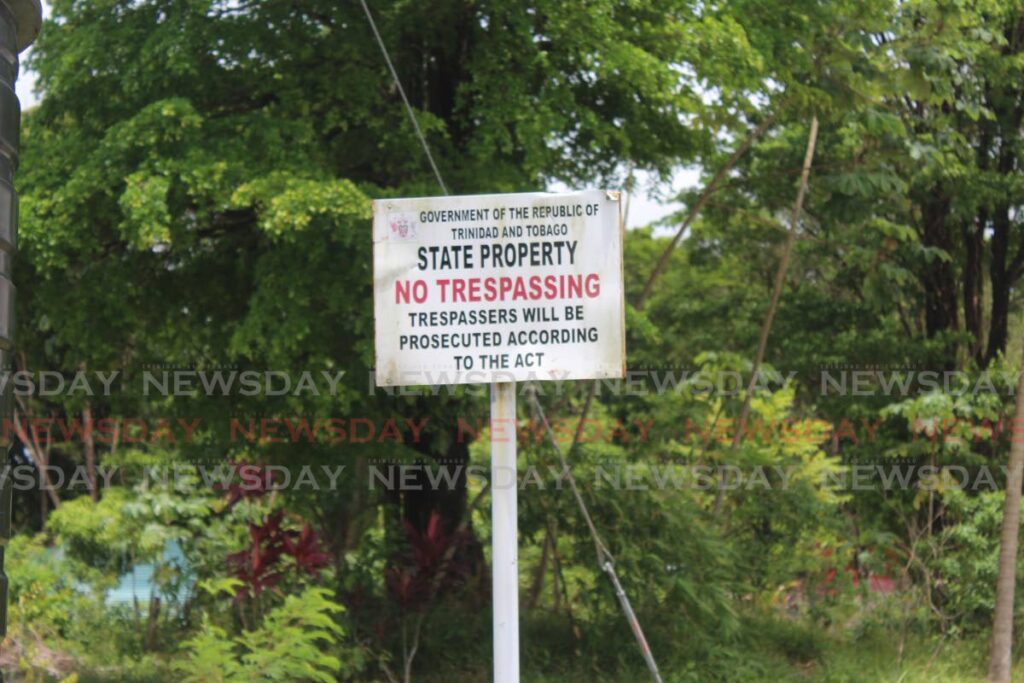LSA: Land-grabbers in scheme for state $

A new type of squatter has emerged in Trinidad and Tobago in recent times. They are known as squat lords, who squat on lands for financial gain and not because of economic hardship.
While the overall numbers of squatters has decreased in recent years, there remain certain squatter hot spots where some people have atried to establish themselves as “squat lords.”
These issues were raised at a virtual meeting between members of the Parliament’s Local Authorities, Service Commissions and Statutory Authorities Committee, the Land Settlement Agency and the Agriculture Ministry on Wednesday.
Squatters are people who settle on property without right or title or payment of rent or on public land to gain a title to that land.
Committee chairman Independent Senator Dr Varma Deyalsingh observed there were many reasons why people squat. Those included poverty, unemployment and eviction from their former homes.
But Deyalsingh said there were some people who were land grabbers who squatted “to get a piece of the action.”
Referring to some newspaper reports which claimed an increase in squatting during the covid19 pandemic, Deyalsingh asked LSA officials whether 2021 was “the year of the squatter.”
LSA CEO Hazar Hosein said from 2018 to April, the number of reported cases of squatting had dropped to just under 1,200. There is no evidence to suggest a squatter explosion during the pandemic. Hosein listed 74, 293 and 157 cases of new squatting for 2020, 2021 and 2022 (so far) respectively.
In contrast, the LSA recorded over 5,000 new squatting cases from 2013-2018.
Hosein said, “There has been a significant reduction in the number of reported cases of new squatting in the prior five years (2013-2018) and the present four years (2018-2022).” He attributed this decline to work done by the Commissioner of State Lands to discourage people from squatting, use of technology (such as drones and satellite imaging) to identify new squatter structures and collaboration with the police to stop new people from squatting.
Deyalsingh reiterated his concern about people with ulterior motives who were squatting.
“There are certain squatters who may have gone into areas to protest (about the Cumuto-Manzanilla) highway. Some think if they go there, they will be paid to move.”
He also said, “Some squatters may be masquerading as farmers by cultivating short-term crops.”
Deyalsingh wondered whether Venezuelan migrants were engaged in this alleged practice and creating “a wild, wild West situation.”
Hosein replied, “There are certain hotspot areas in the country where we have a rush of persons going to squat.”
Sangre Grande and Valencia, especially where the Cumuto-Manzanilla Highway is being built, is one such area.
He said, “We have a term that we use: squat lords. A lot of these persons who are rushing into areas are rushing for commercial reasons rather than economic reasons.”
Deyalsingh replied, “So definitely there has been a squatter invasion in certain areas like Sangre Grande, soon to be the squatting capital (of TT), and also Valencia.”
He was concerned whether this activity could impede government’s developmental plans or had a correlation with crime.
On the latter, Hosein said, “There is some sort of correlation between what takes place in squatting areas and crime, based on reports that you see in the newspaper.” But there is no hard evidence to confirm this.
“That’s why the LSA is not only about developing squatting sites but is all about sustainable development.”
Hosein said the LSA had been gathering information on squatters, including those in the hotspot areas, and submitting to the Commissioner of State Lands, local government corporations and other entities “to take the necessary action in accordance with the law.
He added that there was no specific information to confirm that Venezuelan migrants were squatting.
Tunapuna MP Esmond Forde and D’Abadie/O’Meara MP Lisa Morris-Julian said there had been reports of squat lords in certain squatter communities in their constituencies. Morris-Julian identified Carapo as one such place in D’Abadie/O’Meara. While some regard Carapo as a crime hot spot, she said the majority of its residents were good, law-abiding people.
Agriculture Ministry legal officer Reanna Phagoo-Nandal said there were many challenges in demolishing illegal squatter structures. From January 2018- April, there were 34 land-clearing exercises. Between 2017 and April, Phagoo-Landal said 85 per cent of reports of illegal squatting that the ministry received could not be processed through the courts.
One of the reasons for this was no proper identification for those squatters.
Forde was concerned that little was being done to deal with squat lords.
“The longer it goes on, it is going to become a serious headache in terms of infrastructure development.”
He said that could negatively affect bonafide squatters who had received certificates of comfort.
Hosein said there were 22,000 applications for certificates of comfort before October 27, 2000, when that process ended. He said that meant no one else could apply for those certificates. Of the 22,000 applications, 2,500 are still being investigated.
Hosein said approximately 8,000 people had received certificates to date. People who were squatting on private lands and the relatives of squatters would not be entitled to receive certificates.
Acting Commissioner of State Lands Bhanmati Seecharan said it was difficult to deal with squatting on private lands, as this is out of the remit of her office and the LSA.
“The squatting in Toco is literally out of our hands, because it is on private land.”
Under the law, Seecharan said squatter structures could not be demolished while people were living in them. Very often, she continued, structures which were initially unoccupied were suddenly occupied during the seven-day period in which squatters were told to leave. Seecharan added that the court often ruled in favour of those people if any attempt was made to evict them.


Comments
"LSA: Land-grabbers in scheme for state $"